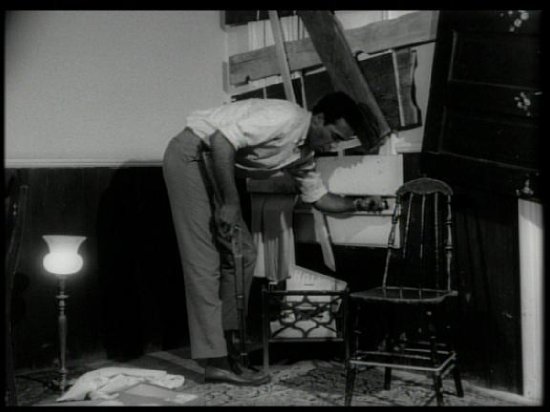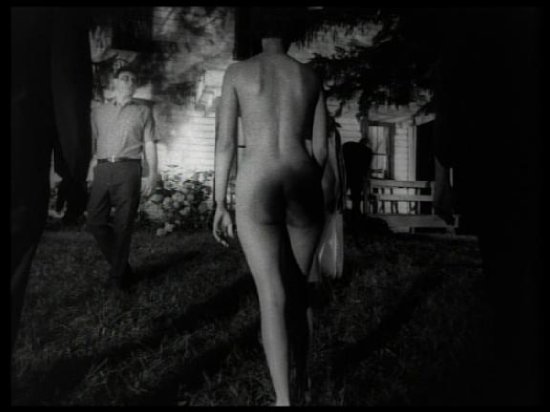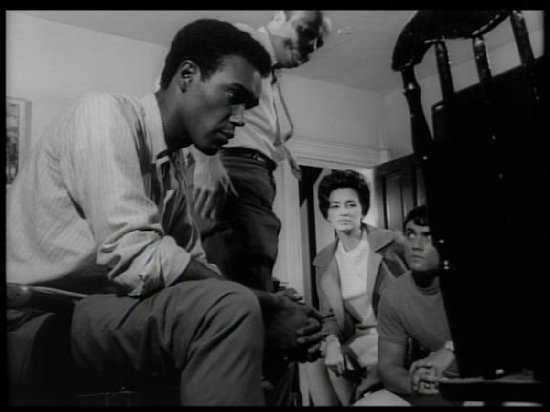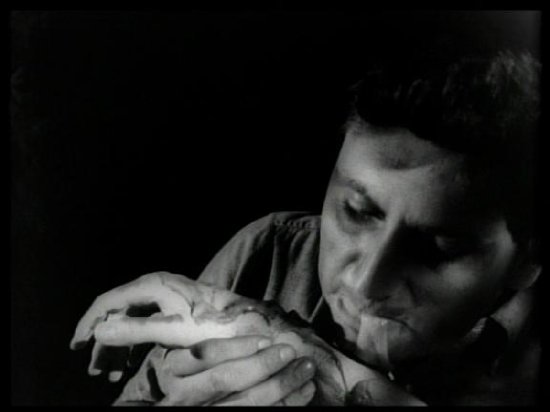Night of the Living Dead
1968 was something of a landmark year for American horror with Roman Polanski bringing Ira Levin's novel Rosemary's Baby to the big screen with critical and commercial success that was almost unprecedented for a horror film - a traditionally seedy and shameful genre - and a young filmmaker from Pittsburgh announced his presence with the sub-genre defining Night of the Living Dead. Along with a group of friends and investors, George A. Romero set up camp in a small house to shoot a ghoul picture using most of the crew as extras (himself included) and shot quickly and with the reckless abandon of youth. He had no idea then that the film he was making would go on to be the first in a celebrated trilogy and launch his name as a force to be reckoned with in the horror genre.
The film begins with a brother and sister finishing their three hour drive from Pittsburgh to lay a wreath on their father's grave. Johnny doesn't see the point in the visit as he doesn't remember his dad and is really only there because his mother wants to commemorate the day but is too old to travel. Barbra is a little more sensitive and takes her frustrations out on her brother, blaming their late arrival on his inability to get up early enough. As she says a silent prayer by the graveside, Johnny begins to reminisce about when they were young and up there with their father. He remembers taunting her as a child and, seeing a man stumbling and shuffling towards them, frightens Barbra by putting on his most terrifying English accent and saying 'They're coming to get you Barbra!' and, when the figure gets closer, continues 'Look, there's one of them now'. Barbra goes to apologise to the man but he only grunts and grabs her, seemingly intent on attacking and biting her. Johnny rushes to her defence but is knocked over and hits his head on a gravestone forcing Barbra to run for her life, getting into the car but, without the keys, can only release the handbrake as the man smashes the window and tries to force his way in.
When the car hits a tree, Barbra flees and finds refuge in an abandoned farmhouse. Her already fragile state of mind is further shaken by the stuffed animals on the wall and any courage she had left disappears when she finds the owner dead and partly eaten at the top of the stairs. Suddenly a truck pulls up outside and a young man, Ben, gets out and quickly takes charge. Trying to get information from the traumatised Barbra, he investigates the house for himself and decides that the best course of action is to get all the pieces of wood they can and board themselves in.
With the house reasonably secure, Ben finds a working radio and giving him (and, vicariously, the audience) updates on the quickly escalating situation. Meanwhile, events in the house begin to unfold as another group of refugees emerge from the cellar and sparks immediately fly between their leader, Mr. Cooper, and Ben for overall control and who will be seen as the Alpha Male.
It's impossible to emphasise just how important Night of the Living Dead is as a landmark in horror and in filmmaking. Opening doors and pushing boundaries, it shocked audiences and industry figures with the gore, violence and depressive attitude thus showing other filmmakers that what they thought was not possible due to the content was not only doable but profitable. Furthermore, it proved that you didn't need the backing of a distribution or production company, nor a wealthy backer to get your film made, just a group of committed individuals, talent and equipment. Without it there would probably be no Blair Witch Project or any of the other, more recent, films that were shot on a shoestring budget and made their money back, and more, when well marketed and top films to boot.
Night of the Living Dead has long been a favourite of mine since I discovered it when I was getting into horror and picking up all the genre classics, including the other two instalments in Romero's original 'Dead' trilogy. I may prefer Dawn of the Dead but can watch this any time without any lack of enjoyment with each viewing.
The Disc
Extra Features
The disc comes with two commentaries, the first with Romero and several cast members and the second with members of the cast. Neither are terrific but are worth a listen as they reminisce and laugh about their own performances and the hardships on the set. This is as close as you'll get to a 'making of' as there was barely enough money to make the film, let alone have another crew on set documenting proceedings.
There is an 8 minute parody film, Night of the Living Bread, in which people are being attacked by malevolent pieces of sliced white! It's only brief but is quite amusing. There are two radio interviews with Duane Jones and Judith Ridley in which they talk about the film and how they became involved in the project - it's worth noting that this is the last interview Jones gave before he died.
Romero's 'lost' film, There's Always Vanilla features as a series of stills and a brief clip. From what you can see, it's not a great film with some terrible acting so it's perhaps not a bad thing that the film is not available to spoil Romero's résumé.
The script is available to read and it's interesting how closely the film follows the original screenplay. Also included are some commercials and other early material shot by George Romero.
Rounding off the package is a collection of trailers and TV/radio spots which show how carefully and well it was marketed. The set comes with a booklet containing some interesting notes by Stephen King.
The Picture
I've bought this film three times and never seen it look so good. There are a few instances of dirt and grain but these are barely noticeable and the overall impression is of a film that has been painstakingly restored with excellent clarity, definition and black levels. The shooting technique is a strange mix between claustrophobic strain and vérité documentary style which works superbly to create the horror, tension and exploit the stresses within the group.
Romero shot separate footage which is seen on the TV as a way of using exposition without it appearing clunky or tacked-on and this helps to add to the sense of realism and the characters' isolation.
The Sound
It's hard to look back at the film and watch it as people did four decades ago as some of the music and sound effects now seem clichéd - it was this film that established such music and it's other films that followed the convention. Much of the film has no music which, again, adds to the sense of realism.
The disc gives you a choice of the original mono or a Dolby Digital 5.1 track. As it was shot in mono and is predominantly front-loaded, there is nothing lost by choosing the mono over the surround of track but, over the many times I have watched this, I prefer (but only just) the 5.1 option as it seems a tiny bit clearer and the few moments in which the surrounds are employed add to the experience.
Final Thoughts
Night of the Living Dead is a true genre classic, a landmark film and a terrifically innovative piece of filmmaking. Some of the acting may be a little wooden but it is still a remarkably gripping film thanks in no small part to Duane Jones' superb performance in the lead and Romero's assured direction which is amazing considering the lack of experience at just about every level, including his.
As I mentioned, this is the third time I have bought it on DVD and this version is the best available. Those interested in the history of film, newcomers to the horror genre and hardcore fans of the film who don't own this version should buy it.




Your Opinions and Comments
Be the first to post a comment!